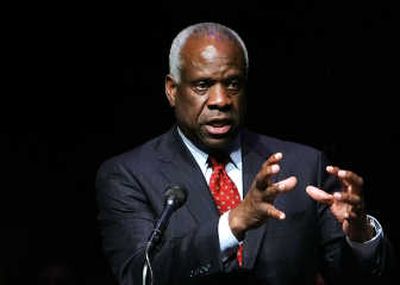Thomas book condemns liberals, media

WASHINGTON – Supreme Court Justice Clarence Thomas settles scores in an angry and vivid forthcoming memoir, scathingly condemning the media, the Democratic senators who opposed his nomination and the “mob” of liberal elites and activist groups who he says desecrated his life.
“My Grandfather’s Son,” for which Thomas has received a reported $1.5 million, is a 289-page memoir of his life in rural Georgia, his reliance on religious faith and his rise to the Supreme Court. His book ends with the day he was sworn in and contains only fleeting mentions of his time on the bench.
Thomas lovingly describes the iron-willed grandfather who raised him after his own father abandoned him as a toddler; critically admires the Catholic Church that provided him with an education but was not as “adamant about ending racism then as it is about ending abortion now”; and gives a detailed description of the confirmation hearings that electrified the nation in 1991 and the sexual harassment allegations by Anita Hill that he said destroyed his reputation.
They are the most extensive comments Thomas has made about Hill since his confirmation. Though he has given numerous speeches since he has been on the court, he has rarely mentioned Hill or spoken in detail about the nomination fight. In the book, Thomas writes that Hill was the tool of liberal activist groups “obsessed” with abortion and outraged because he did not fit their idea of what an African-American should believe.
“The mob I now faced carried no ropes or guns,” Thomas writes of his hearings. “Its weapons were smooth-tongued lies spoken into microphones and printed on the front pages of America’s newspapers. … But it was a mob all the same, and its purpose – to keep the black man in his place – was unchanged.”
Thomas, 59, says in the foreword to the book, due to go on sale Monday, that he wrote it to “leave behind an accurate record of my own life as I remember it” rather than leave it to those “with careless hands or malicious hearts.” He indicates he wrote it himself, with editing help from three others.
It has been eagerly awaited, especially in the conservative community, which is playing an active role in promoting it. The Heritage Foundation, the Federalist Society and the National Center for Policy Analysis are sponsoring a six-city book tour, where patrons will pay $30 to attend events in Thomas’s honor.
The normally media-shy justice has interviews booked on “60 Minutes” on Sunday night, ABC on Monday and a 90-minute interview with Rush Limbaugh, also scheduled for Monday.
Thomas describes his confirmation hearing as a gut-wrenching experience. When told by an aide to President George H.W. Bush that he was under consideration for the high court, “I tried to think of a way to convince President Bush to choose somebody else.”
Thomas writes that he did not watch Hill’s televised testimony against him at his Senate Judiciary Committee hearing and so does not respond in detail to her charges except to call them lies. He describes Hill as “touchy and apt to overreact. If I or anyone else had done the slightest thing to offend her, she would have complained loudly and instantly, not waited for a decade to make her displeasure known.”
He writes that Hill did a “mediocre” job at the Equal Employment Opportunity Commission, where he was chairman, and misrepresented herself at the time of the hearings as a “devoutly religious Reagan-administration employee.”
“In fact, she was a left-winger who’d never expressed any religious sentiments” and had a job in the administration “because I’d given it to her.”
Thomas credits his mentor, former Missouri Sen. John Danforth, and his wife for getting him through the hearings and said his faith was a critical resource.
But by the time he was confirmed, he said, the prize meant little.
Instead of watching the Senate roll call, he drew himself a bath. His wife came to tell him he had been confirmed 52-48.
“Whoop-dee-damn-doo,” Thomas writes.